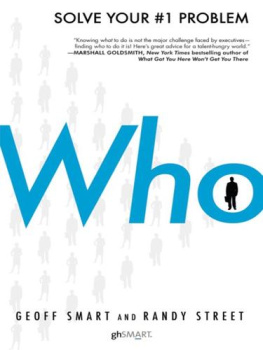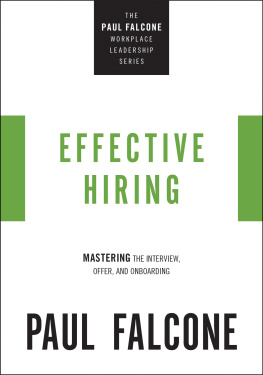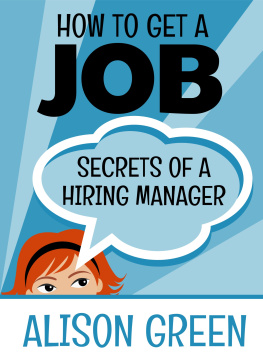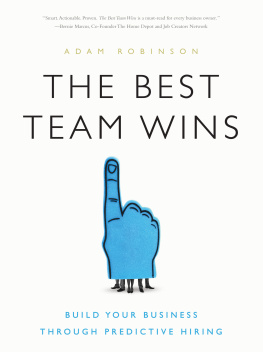Geoff Smart - Who: The A Method for Hiring
Here you can read online Geoff Smart - Who: The A Method for Hiring full text of the book (entire story) in english for free. Download pdf and epub, get meaning, cover and reviews about this ebook. year: 2008, publisher: Ballantine Books, genre: Business. Description of the work, (preface) as well as reviews are available. Best literature library LitArk.com created for fans of good reading and offers a wide selection of genres:
Romance novel
Science fiction
Adventure
Detective
Science
History
Home and family
Prose
Art
Politics
Computer
Non-fiction
Religion
Business
Children
Humor
Choose a favorite category and find really read worthwhile books. Enjoy immersion in the world of imagination, feel the emotions of the characters or learn something new for yourself, make an fascinating discovery.
- Book:Who: The A Method for Hiring
- Author:
- Publisher:Ballantine Books
- Genre:
- Year:2008
- Rating:3 / 5
- Favourites:Add to favourites
- Your mark:
Who: The A Method for Hiring: summary, description and annotation
We offer to read an annotation, description, summary or preface (depends on what the author of the book "Who: The A Method for Hiring" wrote himself). If you haven't found the necessary information about the book — write in the comments, we will try to find it.
In this instant New York Times Bestseller, Geoff Smart and Randy Street provide a simple, practical, and effective solution to what The Economist calls the single biggest problem in business today: unsuccessful hiring. The average hiring mistake costs a company $1.5 million or more a year and countless wasted hours. This statistic becomes even more startling when you consider that the typical hiring success rate of managers is only 50 percent.
The silver lining is that who problems are easily preventable. Based on more than 1,300 hours of interviews with more than 20 billionaires and 300 CEOs, Who presents Smart and Streets A Method for Hiring. Refined through the largest research study of its kind ever undertaken, the A Method stresses fundamental elements that anyone can implementand it has a 90 percent success rate.
Whether youre a member of a board of directors looking for a new CEO, the owner of a small business searching for the right people to make your company grow, or a parent in need of a new babysitter, its all about Who. Inside youll learn how to
avoid common voodoo hiring methods
define the outcomes you seek
generate a flow of A Players to your teamby implementing the #1 tactic used by successful businesspeople
ask the right interview questions to dramatically improve your ability to quickly distinguish an A Player from a B or C candidate
attract the person you want to hire, by emphasizing the points the candidate cares about most
In business, you are who you hire. In Who, Geoff Smart and Randy Street offer simple, easy-to-follow steps that will put the right people in place for optimal success.
From the Hardcover edition.
**
From BooklistThink of Who as the literal and figurative son of TopGrading (2005), by Brad Smart. Coaches and consultants Smart and Street have broadened the how-to-hire process from interviews to a 360-degree perspective on recruiting A players. Its a compelling read for many reasons: the research is solid and expansive, based on actual work, CEO/top-management interviews, and statistics analyses from a top graduate business school. Its simple: instead of 6 reasons here and 10 steps there, the authors boil down their recommendations into a 4-step process, from scorecard and source to select and sell. Who wouldnt like to read stories from well-known CEOs like George Buckley of 3M, opening up the mysterious method of executive hiring? And finally, its a book laced with humor; anecdotes about interviewees whove told their stories all too well are not only laughable but memorable, toofor all the right reasons. Like the candidate who bugged his boss office because he never received any performance appraisals. Intended for executive readersand human resources follow-through. --Barbara Jacobs
ReviewSeventy percent of the game is finding the right people, putting them in the right position, listening to them, and alleviating what gets in their way. Who is a practical guide to making sure you get the right people to start with! Excellent advice and guide.Robert Gillette, president and CEO, Honeywell Aerospace
Geoff Smart and Randy Street have done an amazing job distilling the best advice from some of the worlds most successful business leaders.Wayne Huizenga, founder, Blockbuster Video
A great readit really is all about finding, keeping, and motivating the team. John Malone, chairman, Liberty Media Corporation
The key point in this book is that those of us who run companies should include who decisions near the top of the list of strategic priorities.John Varley, group chief executive, Barclays
Who is the only book you need to read if you are serious about making smart hiring and promotion decisions. It is the most actionable book on middle- and upper-management hiring that Ive read after twenty years in HR.Ed Evans, executive vice president and chief personnel officer, Allied Waste Industries
I wish I had this book thirty years ago, at the beginning of my career!Jay Jordan, chairman and CEO, the Jordan Company
This book will save you and your company time and money. In business, what else is there?Roger Marino, co-founder, EMC Corporation
You ll find yourself nodding yes, saying Thats right, and thinking, Oh, Ive been there, all the way through this grand slam of a book. Whether youre starting a company or running a part of a big one, the level of success you achieve is almost always a result of choosing the right people for the right jobs at the right time. Its all about the who!Aaron Kennedy, founder and chairman, Noodles & Company
Geoff Smart: author's other books
Who wrote Who: The A Method for Hiring? Find out the surname, the name of the author of the book and a list of all author's works by series.








